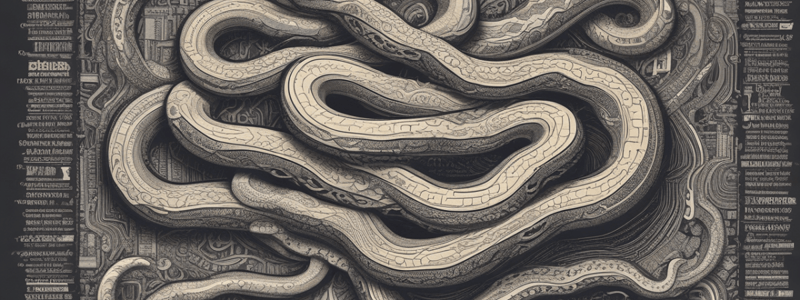Podcast
Questions and Answers
Which operation cannot be performed directly on a tuple?
Which operation cannot be performed directly on a tuple?
- Accessing elements
- Iteration through elements
- Changing element values (correct)
- Concatenation
What is the main characteristic of a dictionary in Python?
What is the main characteristic of a dictionary in Python?
- It is ordered and allows duplicate values.
- Its elements can be accessed by index.
- It contains key-value pairs. (correct)
- It can only store integers as keys.
Which method would you use to add an item to the end of a list?
Which method would you use to add an item to the end of a list?
- pop()
- insert()
- extend()
- append() (correct)
Which of the following statements about list indexing is true?
Which of the following statements about list indexing is true?
What will occur if you try to access a key that does not exist in a Python dictionary?
What will occur if you try to access a key that does not exist in a Python dictionary?
Study Notes
Lists
- Lists are ordered, mutable collections that can hold a variety of item types (e.g., integers, strings, other lists).
- Accessing list elements is done via indexing, starting at 0 for the first element.
- Common operations on lists include adding elements (using
appendorinsert), removing elements (usingremoveorpop), and slicing for sublists. - Lists support methods like
sortfor sorting items andreversefor reversing the order of elements.
Tuples
- Tuples are ordered, immutable collections that can contain multiple items, similar to lists but cannot be changed after creation.
- Accessing elements in a tuple is also done through indexing.
- Operations include concatenation (using
+to combine tuples) and repetition (using*to repeat tuples). - Tuple methods are limited; they mainly include
countfor counting specific elements andindexfor finding the first occurrence of an item.
Dictionaries
- Dictionaries are unordered collections of key-value pairs, providing a way to store and access data using unique keys.
- Values in dictionaries can be accessed using their respective keys, and dictionaries allow for quick lookups based on these keys.
- Commonly used operations involve adding new key-value pairs, updating existing values, and deleting items using methods like
popanddel. - Dictionary operations include methods like
keysfor accessing keys,valuesfor retrieving values, anditemsfor obtaining key-value pairs.
Properties
- In Python, properties are special attributes that compute values dynamically, often used in classes to manage state and encapsulation.
- Properties are defined using the
@propertydecorator and can include getter, setter, and deleter functions for managing access to private attributes. - This mechanism allows for controlled access and modification of attributes, enhancing data integrity and encapsulation in object-oriented programming.
Studying That Suits You
Use AI to generate personalized quizzes and flashcards to suit your learning preferences.
Description
This quiz covers the fundamentals of Python data structures such as lists, tuples, and dictionaries. Learn about accessing elements, performing operations, and using various functions and methods associated with these data types. Test your knowledge and improve your understanding of these essential Python components.




